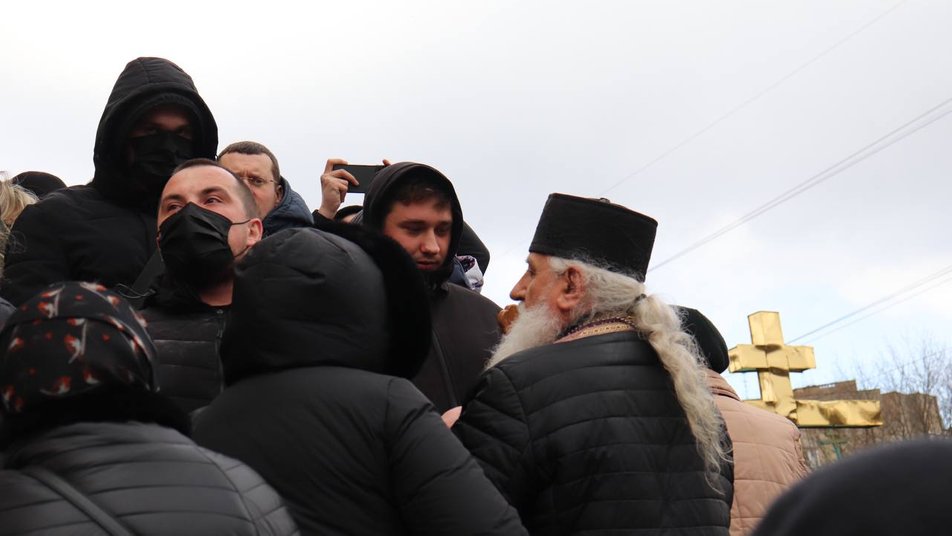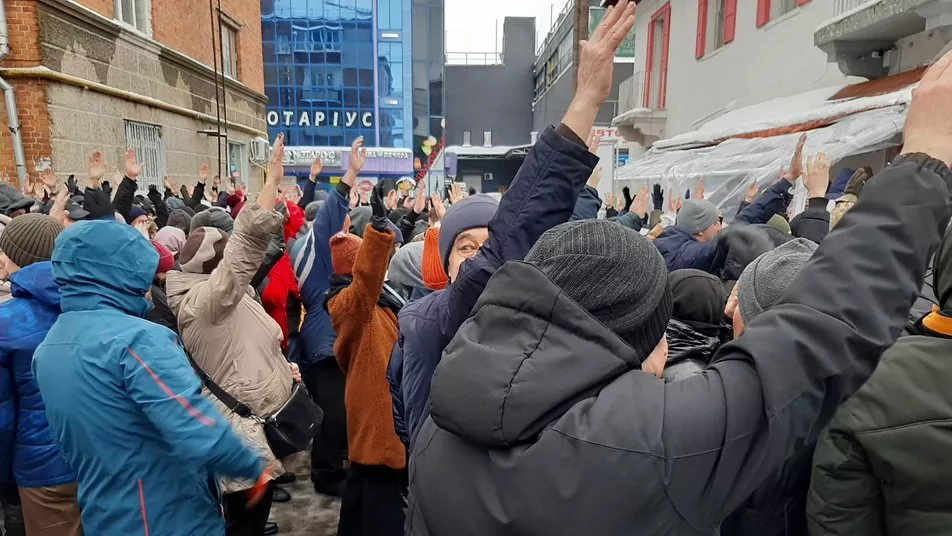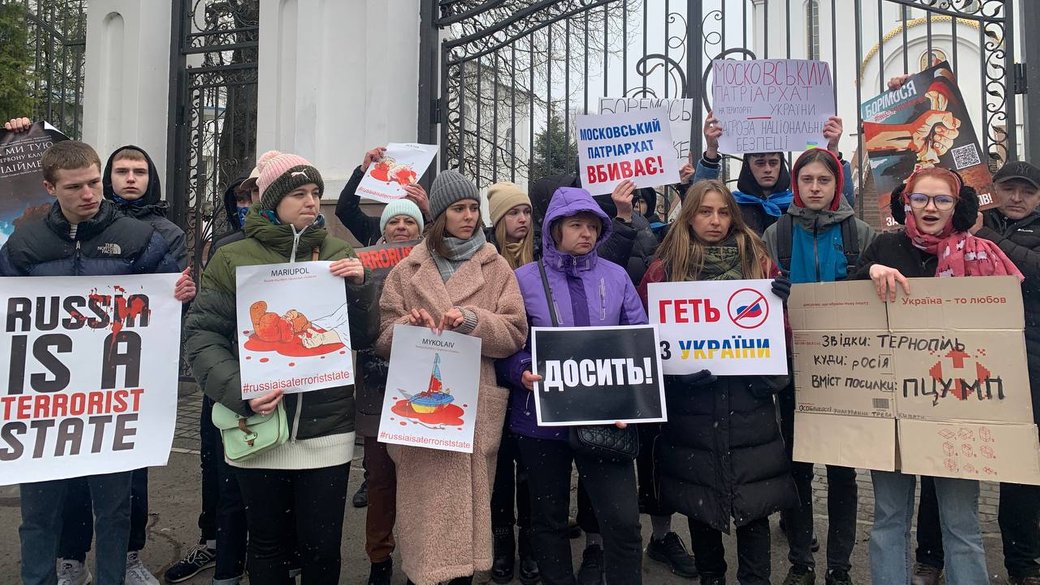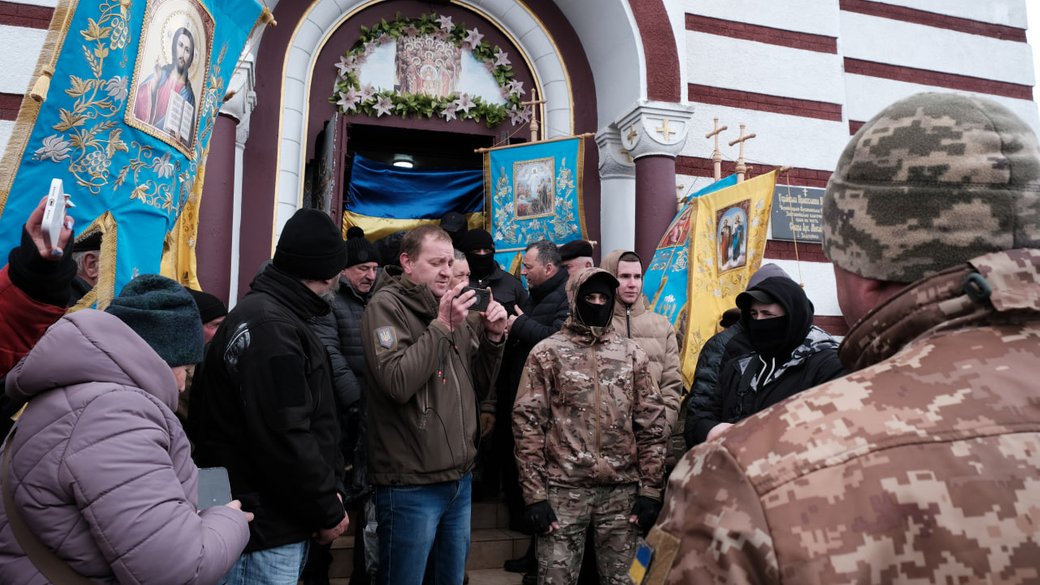While the standoff around the Kyiv-Pechersk Lavra, a major UOC MP monastery in the Ukrainian capital that defies eviction orders, is mainly civil, the situation in Ukraine's regions is growing tenser, with churches migrating from the UOC MP to the OCU amid a rising wave of public annoyance at the Moscow-backed church and, sometimes, questionable circumstances.
The OCU, having received a Tomos of autocephaly (independence in churchspeak) from Ecumenical Patriarch Bartholomew in 2018, numbered 7097 parishes in 2020, while the UOC MP comprised considerably more parishes, 12410. The proportions reflect a time when the UOC MP enjoyed priority treatment from the Ukrainian state as the only "canonical" church, i.e., recognized by world Orthodoxy.
This changed in 2018: the OCU also became a "canonical" church, and the process of parish migration began. Since 2018, 1253 parishes were registered to have left the UOC MP for the OCU, as the popularity of the Moscow-backed church plummeted amid Russia's war against Ukraine. This process has accelerated in the last several days amid growing administrative pressure on the UOC MP and draft laws to ban the church. Here are some recent examples that illustrate the tenseness of the situation.
28 March. Scuffles erupted inside a UOC MP cathedral in Ivano-Frankivsk, where UOC MP priests attempted to prevent the entrance of a group of OCU supporters who cut through the church's welded gates. Tear gas was used inside the church, although it is unclear by which side. The mayor of Ivano-Frankivsk Ruslan Martsinkiv reported that the Ivano-Frankivsk Oblast is the first region in Ukraine to be "free of the Moscow Patriarchate."

In the preceding year, the church underwent a period of legal uncertainty, as a part of the parish voted to join the OCU while the priests did not.
Overall, the latter situation is fairly common for the church jurisdiction-changing process in Ukraine; often, the UOC MP denounces the legitimate decision-making process on the part of the parish as the "seizure" of a church. At other times, the voting procedure has questionable legitimacy, as those participating are said not to be true parishioners. However, the issue of eligibility to vote in such a church jurisdiction switch is a contentious one: official registers of parishioners simply do not exist, opening up the possibility of manipulations from both the UOC MP and OCU.
The picture of this church's takeover turned out to be so unpalatable that OCU leader Metropolitan Epifaniy issued a statement condemning the use of force against a place of worship.
2 April. A video of a Ukrainian veteran being roughly escorted out of a liturgy in UOC MP cathedral in the west-Ukrainian city of Khmelnytskyi after asking "how many people must be killed so that people stop going to the Moscow church" went viral, and after hundreds gathered outside the church, a procedure of voting to change the temple's jurisdiction was held. The priest voluntarily surrendered the keys and was promptly dismissed by the UOC MP leadership.
5 April. In a case that particularly reveals the complexities of the Ukrainian Orthodox parish situation, a church in the Zadubrivka village of the south-western Chernivtsi Oblast was taken over by OCU supporters after a video was shown of the UOC MP priests refusing to open the doors for funeral rites of a Ukrainian soldier who was killed defending his country from the Russian invasion of Ukraine, prompting knee-jerk societal accusations that the Moscow-affiliated priests took the opportunity to scoff at the killed soldier as they actually support the Russian invasion.
Naturally, such insinuations elicited societal outrage, and so the subsequent video of the church doors being broken down and the OCU MP priests being expelled for the sake of this funeral rite appeared as overdue retribution against an internal enemy. However, the actual situation is more complex. In a video released after the capture of the church, the OCU MP priest released a video stating that all funerals were customarily held in the churchyard and not inside the church, and this was agreed with the organizers of the funeral of the KIA soldier.
But the real reason for the UOC MP priests not letting the funeral inside is that they understood that if they let the OCU supporters in, the latter would take over the church, religious scholar and professor of the Ostroh Academy Andriy Smyrnov explained to Euromaidan Press. This particular church had a legal status in limbo: in 2019, the parish voted to leave the UOC MP and join the OCU, which should have been reason enough for them to be allowed to use the church building. However, this did not happen: the UOC MP took the case to court and won, but the OCU appealed the decision and how awaits the final verdict. Over all this time, the part of the parish that voted to join the OCU was denied entrance to the church building and the police sabotaged their duty to ensure that they are allowed to use it, likely due to pressure from the regional state authorities, while the OCU had claimed a plethora of provocations from the side of the UOC MP which impeded use of church property.
The status now appears to be settled: a viral video of a bereaved mother begging to let the coffin of her son, killed defending Ukraine from the Russians, inside her village church has legitimized the takeover by force of a temple that was supposed to have become the OCU years ago, if the law had been observed.
5 April: A cathedral of the UOC MP in Lviv was transferred to the jurisdiction of the OCU in a way that has become typical for recent days: parishioners were reported to have voted to leave the Moscow-backed church during a convention that the UOC MP claimed was illegitimate and constituted "seizure" of the cathedral. Yet another UOC MP church lost access to private land they rented because the land owner rescinded the lease agreement.
5 April: Another church of the UOC MP in Khmelnytskyi changed jurisdiction to the UOC due to a vote in front of the church building. The church priest considered the vote illegitimate because the territorial community participated in it, not only parishioners.

Migrations from the UOC MP snowball amid public anger
The above cases are only five examples of a process picking up speed: parishes are leaving for the UOC MP with skyrocketing speed but often questionable legality as calls to ban the UOC MP grow. This process is encouraged by regional governments, who sometimes seem to compete for who will be the quickest to remove the "Moscow patriarchate" from their territory. It is also fueled by a wave of public anger at a church that is still affiliated with the Russian Orthodox Church, which continues to bless and legitimize Russia's invasion of Ukraine as befitting "Russian world" ideology.
Meanwhile, the Moscow-backed church in Ukraine claims to be persecuted and seeks international support in hopes that international criticism will prompt the Ukrainian authorities to shield the UOC MP from public rage.
It claims that it broke ties with Russia during a council in May 2022, condemned the Russian invasion, and instructed churches to omit naming Moscow Patriarch Kirill during services. However, some UOC MP hardliners resisted this and continued praying for Kirill. As well, the UOC MP did not make its statute public, leaving doubts about what actually changed. Suspicions arose that the UOC MP did not truly break ties with Moscow, as no repercussions followed from the latter and other Orthodox churches continued communicating with the UOC MP as if it was still part of the Russian Orthodox Church. An independent expert committee brought clarity to the situation when it concluded that the UOC MP was still linked to Russia despite claims to the contrary and that it remains a subsidiary of the Russian Orthodox Church. Experts confirmed this assessment in interviews with Euromaidan Press:
There are two explanations for the preservation of the UOC MP's jurisdictional connection.
- A part of the UOC MP hierarchy indeed views itself as part of Russia.
- By unilaterally proclaiming autocephaly, or independence, from the Russian Orthodox Church, the UOC MP will find itself a schismatic church -- an absolute taboo. Having cultivated the aura of Ukraine's only canonical (ecclesiastically legal) church for decades and resisting dialogue with the OCU, it chooses to maintain the connection with the aggressor state as the better option than becoming an "illegitimate" church that is disobedient to the ecclesiastical rules.
The situation shows no signs of de-escalation. On the contrary, lawsuits to ban the UOC MP are registered in the Ukrainian parliament, and regional councils issue appeals to the parliament demanding the same. Regional councils have also adopted laws to revoke all lease agreements of municipal property, such as cathedrals and churches, to the UOC MP, and this process is picking up steam.

Why the public anger? In many ways, it results from years of the state giving the UOC MP priority treatment and turning a blind eye to its activities in the service of Russia.
Regarding priority treatment, the UOC MP was often allowed to build temples without proper permits; one such temple was dismantled today in Lviv. The OCU plans to build a cathedral in its stead.
Regarding activities in the service of Russia, UOC MP hierarchs of the church acted as agents of Russian influence for many years; however, only now did Ukraine's Security Service start to charge them with violating national security. Examples of the charges brought against UOC MP hierarchs include:
- Accusations of justifying Russian aggression through republishing materials from the Russian Orthodox Church, where Patriarch Kirill calls to support the Russian Army invading Ukraine levied against the Metropolitan of the Cherkasy Eparchy.
- Additionally, a former Kharkiv Oblast priest who subsequently escaped to Russia was charged under Article 436-2 of the Criminal Code of Ukraine (justification, recognition as lawful, denial of the armed aggression of the Russian Federation against Ukraine, glorification of its participants)" for blessing Russian military equipment while his city, Izium, was occupied by the Russians in 2022.
- And Metropolitan Pavlo, abbot of the Kyiv Pechersk Lavra where the UOC MP is currently resisting eviction orders, was charged with denying Russian aggression and inciting religious hatred. However, convincing proof of the charges is yet to be presented in court.
These charges are the latest that have emerged from a wave of Security Service raids on UOC MP facilities that started in the fall of 2022.
However, yet another reason for the UOC MP's current loneliness in the trials it experiences is its failure to build authority in Ukrainian society, writes religious observer Kateryna Shchotkina:
"It has created a desert around itself, in which it now cries out. Over the decades of work in Ukraine, it has not established an authority in society strong enough to withstand propaganda. The UOC MP has failed to communicate with Ukrainian society, but worse, it has also failed in its mission to Ukrainian society. Simply because it never wanted to listen to it and learn to understand it. It has always been superior to it: demanding obedience, not participation and cooperation. And in the critical moment, society repaid the Church in the same coin - it did not want to hear it. Even more - to support it."
Making sense of the chaos
In a Facebook post, OCU speaker Metropolitan Yevstratiy explained the church turmoil by objective factors. The current religious composition of Ukrainian Orthodox church communities was formed at a time when the UOC MP enjoyed priority treatment from the state. Since then, society's approval of the UOC MP has plummeted, but the current church structure lags behind. He claimed that the current law allowing parishes to change their jurisdiction is imperfect, that the OCU had proposed a way to legally resolve the situation, but that the UOC MP had blocked attempts at dialogue, perceiving any withdrawal from UOC MP jurisdiction as a "seizure."
Public anger at the UOC MP will continue growing with more revealed Russian collaboration cases. So will the number of parishes being transferred to the OCU amid legal dodginess. Tensions will likely grow until they culminate in a law prohibiting the UOC MP in its current form, at least in the state of affiliation with the Russian Orthodox Church.
The interpretation that UOC MP is now suffering from the withdrawal of once-preferential treatment from the side of the state and a failure to clearly separate itself from the religious-ideological machine of an invading state appears to be plausible. However, what remains to be seen is whether the OCU will choose to cozy up to the state to occupy the empty niche created from the expulsion of the once-dominant UOC MP -- and, possibly, suffer from the same consequences of too close a relationship with the state in the future.
Related:
- Passions in the Lavra: why the Ukrainian state broke its patience with the Moscow-aligned Orthodox Church
- Moscow Patriarchate’s war in the Kyiv-Pechersk Lavra: church turmoil in Ukraine, explained
- SBU charges Moscow-linked Kyiv monastery abbot with inciting religious hatred and denying Russian aggression
- Only 4% of Ukrainians still identify as followers of Moscow Orthodox church – survey
- Ukraine edges closer to banning Moscow-backed Orthodox Church

